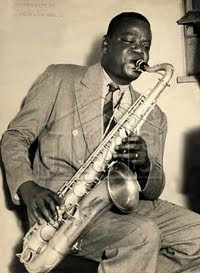'Edinho no choro'
Recently I was pointed to a recording that seems to be a pioneer recording of the electric guitar used in choro. I got curious and searched the online discoteque at Instituo Moreira Salles hoping to find the recording there and having the possibility of listening to it. I was lucky, I found the record searching the title stated in headline above. If you are unfamilar with the search facility at Instituto Moreira Salles, you have the possibility to listen to 'Edinho no choro' by clicking here or headline - the musicplayer available at Instituto Moreira Salles opens in a new window and then you can listen to the streaming audio after it has loaded.
'Edinho no choro' was released on a Continental 78 rpm in 1945 (Continental, 15.337) and it is performed by Pereira Filho playing the electric guitar accompanied by his Conjunto. Comparing the recording with recordings of the electric guitar from the same time made in the USA or Europe the sound of the instrument is rough and distorted in certain sequences caused by problems with an adequate volume control during recording, anyway, a lot of early recordings of the electric guitar suffer from the same problem, refining of pick-ups at the guitar, amplifiers and recording equipment had to wait another decade to be solved sufficiently. Never mind, the recording of 'Edinho no choro' is a valuable historical document of the electric guitar used in choro, especially considering the fact that choro traditionally has been performed using acoustic instruments only. Of course, there are other early examples of an electric instrument used in choro - i.e. Garoto (Anibal Augusto Sardinha) made recordings of choro and related music 1943 playing the electric lap steel guitar accompanied by pianist Carolina Cardoso de Menezes (- like in the USA the electric lap steel guitar seems to have been the first electric string instrument used in Brazil).
No photo and not much info available on the main performer of 'Edinho no choro', however, here is an English summary of the profile in Dictonário Cravo Albin - the main source in Portuguese about Brazilian MPB artists.
Pereira Filho (João Pereira Filho) (1914-1986) was born in Rio de Jaineiro as a son of a professor of the violão, João Pereira. Already as a kid of 4 years of age he started playing the cavaquinho and he had bandolim lessons with his father even before he could read. While at primary school he formed small conjuntos with his school mates and performed at private parties, soon deciding to study the violão as his main instrument. At 11 years of age he participated in a festival promoted by Istituto Nacional de Música and soon after he was featured in a spectacle at Teatro Lírico, "Reisados e cheganças", promoted by the city Hall of the City of Rio de Janeiro. He composed his first piece for solo violão,"Variações sobre cateretê", in 1929, and in 1930 he became a member of Orquestra de Napoleão Tavares. In 1932, he joined Orquestra de Ioiô, where he stayed as a member the following eight years. In 1933, he recorded his first solo record for Victor of his own compositions, "Jongo africano" and the waltz "Áurea". In 1936, he recorded "Variações sobre cateretê" for Victor, and in 1937 he recorded the samba canção, "Tua partida", together with Mário Morais and vocal by Francisco Alves, also for Victor. - In 1941, Pereira Filho formed his own Conjunto. In 1944, he accompanied singers Dircinha Batista and Déo in two recordings, and in 1945 he recorded "Edinho no choro" for Continental. In 1951, Pereira Filho e seu Conjunto accompanied Pedro Raimundo in five recordings for the Todamérica label, and in 1953 Pereira Filho recorded his own "Conversa fiada" and "Serenata havaiana" for Todamérica. Accompanied by his Conjunto he also recorded the bolero "Garoa" and the dobrado "Borba gato" for Continental the same year. In 1959, Pereira Filho recorded his own "Noite sem rumo" for Todamérica, which seems to be his last solo recording.
---Jo



0 Comments:
Post a Comment
<< Home